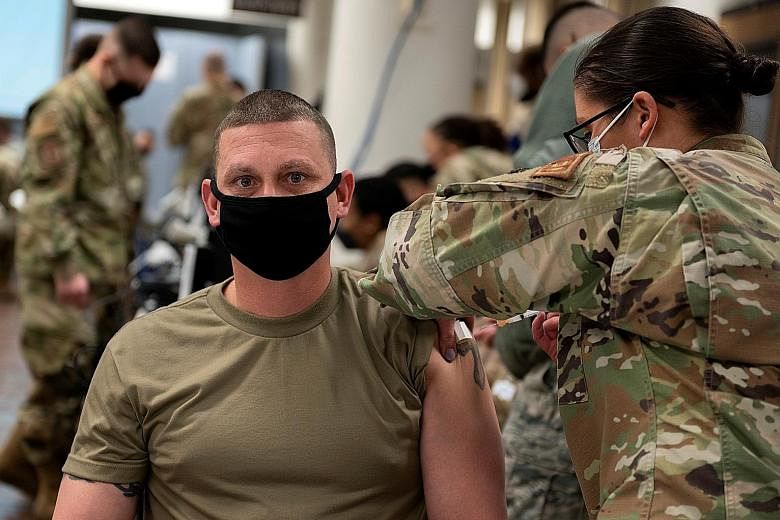South Koreans working for the United States army here could be among the first to get inoculated for Covid-19 as early as this week, while the rest of their countrymen fume over the government's delay in buying vaccines amid a relentless third wave of infections that has raised the total figure to over 58,000.
"We can only envy Singapore," an editorial in JoongAng Ilbo newspaper lamented last week after the city state became the first in Asia to approve and receive the first batch of available vaccines by American drugmaker Pfizer and German biotech firm BioNTech.
South Korea's turn will come only in February or March when its first purchased vaccines - from British-Swedish drugmaker AstraZeneca - arrive.
The delay has been blamed on the government's failure to recognise the importance of securing vaccines early.
Because the health authorities had managed to flatten the curve early on during the pandemic, the government saw no urgent need in inking vaccine deals with international drugmakers and instead supported domestic efforts to develop a "Korean cure".
Professor Choi Jae-wook of Korea University's College of Medicine said the government misjudged the situation and did not listen when medical experts urged them to secure vaccines early on.
"Of course, it's good to let Korean firms develop our own vaccine but you have to make plans based on the real situation," he told The Straits Times.
It was not until October that South Korea made advance payment with Covax, the global vaccine project, to secure 10 million vaccine doses. Meanwhile, vaccines from Pfizer and US biotech firm Moderna were rolled out in Britain and the US this month.
A batch arrived in South Korea last Friday for the US Forces Korea and the first shots were given to healthcare workers and first responders yesterday.
As JoongAng Ilbo noted, the first available vaccines were all snapped up by the time South Korea decided to join the race. "Blind faith has led authorities to neglect vaccines," the paper said.
It was only under mounting public pressure that the government reportedly scrambled recently to finalise deals with Pfizer, Moderna and Belgium-based Janssen to bring in more vaccines from the second quarter of next year.
However, President Moon Jae-in has insisted that the government is "proceeding smoothly according to our original plan".
Speaking to reporters on Monday, he dismissed criticism that the government had fumbled its vaccine procurement and said South Korea had secured enough doses for inoculations to start in February, and is now buying additional supplies for emergency use.
The Health Ministry had said on Dec 8 that it had secured early access to vaccines for 44 million people, from Covax and four other drugmakers.
The number of doses has since been increased to 56 million, with a Moderna deal to cover 20 million people sealed by President Moon himself on Monday.
Public concern over vaccines is growing as infection figures show no sign of falling despite tightened virus control measures such as banning gatherings of more than four people.
South Korea yesterday reported 1,046 new cases, including 1,030 local infections. This brought the total to 58,725 - overtaking Singapore's figure. A record 40 new fatalities raised the death toll to 859.
On the same day, the government also unveiled a third round of economic relief measures worth 9.3 trillion won (S$11.3 billion) to help small businesses forced to close, and freelancers. Payouts will begin on Jan 11 and benefit 5.8 million people.
Prof Choi of Korea University said vaccines could be the "game changer in a pandemic".
"Once 20-25 per cent of the population is vaccinated, you will see visible effects on the infection rate and people will feel more comfortable and secure," he said.
"By next March, the infection rate would have gone down in countries that started vaccination early and they can start resuming normal life, but Koreans will still have to wait. That's why people are angry with the government."











